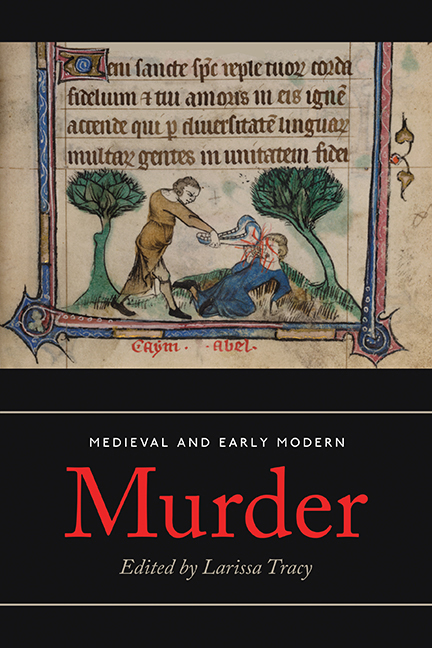Book contents
- Frontmatter
- Contents
- List of Illustrations and Tables
- Acknowledgements
- Contributors
- List of Abbreviations
- Introduction: Murder Most Foul
- I Murder on Trial: Justice, Law and Society
- 1 Secret Killing and Murder by Magic in the Law of Adomnán
- 2 Discursive Murders: The St Brice's Day Massacre, Beowulf and Morðor
- 3 Mourning Murderers in Medieval Jewish Law
- 4 Treacherous Murder: Language and Meaning in French Murder Trials
- 5 ‘Mordre wol out’: Murder and Justice in Chaucer
- II The Public Hermeneutics of Murder: Interpretation and Context
- III Murder in the Community: Gender, Youth And Family
- Conclusion
- Select Bibliography
- Index
4 - Treacherous Murder: Language and Meaning in French Murder Trials
from I - Murder on Trial: Justice, Law and Society
Published online by Cambridge University Press: 05 July 2018
- Frontmatter
- Contents
- List of Illustrations and Tables
- Acknowledgements
- Contributors
- List of Abbreviations
- Introduction: Murder Most Foul
- I Murder on Trial: Justice, Law and Society
- 1 Secret Killing and Murder by Magic in the Law of Adomnán
- 2 Discursive Murders: The St Brice's Day Massacre, Beowulf and Morðor
- 3 Mourning Murderers in Medieval Jewish Law
- 4 Treacherous Murder: Language and Meaning in French Murder Trials
- 5 ‘Mordre wol out’: Murder and Justice in Chaucer
- II The Public Hermeneutics of Murder: Interpretation and Context
- III Murder in the Community: Gender, Youth And Family
- Conclusion
- Select Bibliography
- Index
Summary
UNDER COVER OF DARKNESS in 1262, an escaped prisoner snuck into the town of Montdidier, France, knocked at the first door he came to and when a woman answered, he struck her with a knife.
In 1290, Judoco Reston was arrested in the town of Roye in northern France on suspicion of murder and acting treacherously.
In 1312, the abbot of Saint-Nicolas-sous-Ribemont hired assassins who waylaid the clerk Robert de Suzanne as he headed for an appearance at court against the abbot, mortally wounding him.
In 1320, Robin de La Fontaine brutally attacked a valet of the king, cutting off his nose before killing him.
This is a small sample of the murder cases heard by the Parlement of Paris from 1254 to 1320. The diversity of victims and perpetrators displays a range of motives, and the cases also feature multiple times and locations – during the day, at night, in the home, on the public road – with an even greater variety to be had within the full set of 667 extant wrongful death cases tried in this sixty- seven-year period. The variety was such that the records show little by way of a pattern with regard to murder in late thirteenth- to early fourteenth-century France, though studies of the fourteenth and fifteenth centuries tend to evince clear trends and patterns, especially those focused on specific towns and smallscale localities. Although the records of the Parlement of Paris from 1254 to 1320 (inclusive) chiefly record incidents in northern France, the reach of royal jurisdiction was gradually expanding due to successful royal claims on non- domain territories, the development of an organised and increasingly autonomous court system, and the piecemeal negotiation of royal rights versus local privileges in lands beyond the Ile-de-France. Cases from Gascony and Languedoc are not uncommon, increasing the diversity of material in the court's records. Moreover, historical studies that focus on a single region rarely have to contend with a judicial system in flux, yet, in the second decade of the fourteenth century, Parlement not only extended its reach but also began operating independently from the king. The Capetian rulers had established an administrative network of baillis and seneschals that encouraged a governing and fiscal structure with Paris at the centre, though, in reality, France retained many centrifugal forces.
- Type
- Chapter
- Information
- Medieval and Early Modern MurderLegal, Literary and Historical Contexts, pp. 96 - 114Publisher: Boydell & BrewerPrint publication year: 2018



